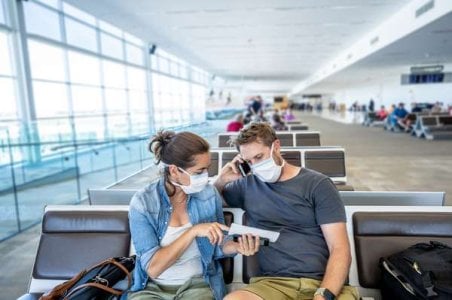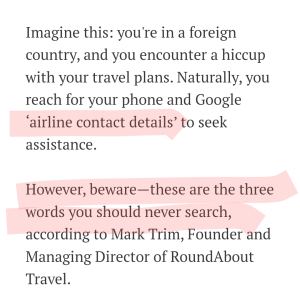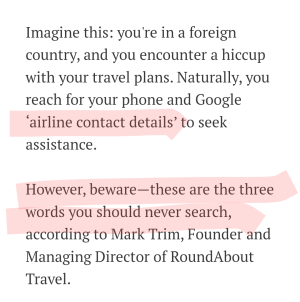High-flying scam: Expert warns Aussies about Googling airline contact details!
- Replies 7
Travelling can be one of life's greatest joys, especially for those who have bid farewell to the daily grind and are now enjoying the freedom of retirement. Exploring new destinations, soaking up different cultures, and creating memories for a lifetime are all part of the allure.
However, as Australian globetrotters are discovering, it's not all smooth sailing—or flying, for that matter. A devious scam has emerged, targeting unsuspecting travellers and leaving them out of pocket by thousands of dollars.
Here's what you need to know to protect your hard-earned savings and ensure your travel dreams don't turn into financial nightmares.
Imagine this: you're in a foreign country, and you encounter a hiccup with your travel plans. Naturally, you reach for your phone and Google ‘airline contact details’ to seek assistance.
However, beware—these are the three words you should never search, according to Mark Trim, Founder and Managing Director of RoundAbout Travel.
He said scammers are exploiting this common reflex by setting up fake websites and customer service numbers that appear at the top of search results, masquerading as legitimate airline support.

Mr Trim highlighted that Google scams involving airline contact details are the latest fraudulent schemes affecting Australian travellers, particularly those heading off on European holidays.
‘Third parties are now bidding on these keywords to appear at the top of search results and appearing to be airline contact centre staff,’ he warned.
‘They are in fact masking that they work for the airline, accessing the booking details and overcharging for changes by thousands.’
Mr Trim also mentioned that in the past fortnight, three individuals were deceived into believing their confirmed reservations were on a ‘waitlist’ and needed to pay to secure them, despite their bookings being completely in order.
‘These scammers can update Google Maps listings or make up fake websites/businesses like “flightreservationscentre.com,”’ he warned.
A recent case involved an Australian couple who were scammed out of a staggering $US3585 (approximately $A5320) by someone pretending to be from Lufthansa airline support.
The scammer charged them for ‘new tickets’ and even attempted to dissuade them from disputing the charge with their bank.
Fortunately, the bank intervened, reversing the charge and saving the couple from financial loss.
‘If you filed this dispute in error, please contact your financial institution to cancel the dispute and send us a copy of the reversal letter. Alternatively, you can also contact me through my information below, and I will help you resolve this dispute mutually (sic),’ the email read.
Mr Trim explained that the incident occurred when the client arrived at the airport and encountered an issue during check-in because their infant's surname did not match the mother's surname (due to the infant being born after the original booking).
‘They Googled the airline support number and got through to a scam service that was pretending to be the airline,’ he said.
‘The scammer was clever enough to take advantage of their stressful situation and glean key booking details from them and then let them know they would have to issue new tickets to get the whole booking corrected.’
According to Mr Trim, the scammer obtained the client's credit card details and processed the payment, but the client never received the new tickets as promised.
‘[The email] shows the response from the scam company after the client disputed the charge on their credit card. You can see it had cost them $US3,585, but thankfully their bank intervened,’ he stated.
The scammers used ‘flightdeskbook.com’, which is not a legitimate URL.
‘But per the disputed email, [it] shows they are masking emails from that website as if they are legit,’ Mr Trim explained.
‘They rotate around different but similar domains (for sending emails) so they can’t get caught, as often there is no front-end website active. They use a fake phone number and pretend to be an airline and then mask their emails to look legitimate to trap travellers.’
He explained that many instances involve a client encountering issues at the airport during check-in, such as being late, lacking a visa, or having passport expiry date issues.
In response, they often resort to Googling and calling what they believe to be the airline for assistance.
‘This is where it all goes wrong as they are not actually calling the airline but a scam number that looks right,’ Mr Trim cautioned.
‘The scammer is then able to glean information from the client and use it back to them to say there are issues with their ticket or on a waitlist and they’ll need to pay extra to fix that.’
He mentioned that this typically occurs when scammers disguise the airline's support phone number on Google.
Mr Trim advised travellers to go directly to a service counter at the airport if their flights are delayed or canceled.
However, if travelers must call the airline, ‘they should either get the number from the airport check-in staff or go to the airline's website directly to find the support number (not Google to find a number)’.
‘We have had three clients in the past couple of weeks being impacted by the same scam, but there have been more in the past few months, which is a steady increase over the first few months of the year,’ he added.
As travel scams continue to prey on unsuspecting Australians, it's crucial to stay vigilant against other deceptive practices that target travellers worldwide.
Recently, travellers were victimised by an ‘evil twin’ Wi-Fi scam run by fraudsters at various airports and flights to steal personal data.
Understanding these tactics can help travellers protect themselves from fraudulent activities, particularly when navigating busy airports and seeking assistance from supposed airline support services.
 Have you or someone you know encountered a travel scam? How did you or they address it? Share your experiences in the comments below to help others stay safe.
Have you or someone you know encountered a travel scam? How did you or they address it? Share your experiences in the comments below to help others stay safe.
However, as Australian globetrotters are discovering, it's not all smooth sailing—or flying, for that matter. A devious scam has emerged, targeting unsuspecting travellers and leaving them out of pocket by thousands of dollars.
Here's what you need to know to protect your hard-earned savings and ensure your travel dreams don't turn into financial nightmares.
Imagine this: you're in a foreign country, and you encounter a hiccup with your travel plans. Naturally, you reach for your phone and Google ‘airline contact details’ to seek assistance.
However, beware—these are the three words you should never search, according to Mark Trim, Founder and Managing Director of RoundAbout Travel.
He said scammers are exploiting this common reflex by setting up fake websites and customer service numbers that appear at the top of search results, masquerading as legitimate airline support.

An expert shared a scammer's email to an airline passenger that exposed a major fraud targeting Australian travellers via fake airline contact details on Google. Credit: Shutterstock
Mr Trim highlighted that Google scams involving airline contact details are the latest fraudulent schemes affecting Australian travellers, particularly those heading off on European holidays.
‘Third parties are now bidding on these keywords to appear at the top of search results and appearing to be airline contact centre staff,’ he warned.
‘They are in fact masking that they work for the airline, accessing the booking details and overcharging for changes by thousands.’
Mr Trim also mentioned that in the past fortnight, three individuals were deceived into believing their confirmed reservations were on a ‘waitlist’ and needed to pay to secure them, despite their bookings being completely in order.
‘These scammers can update Google Maps listings or make up fake websites/businesses like “flightreservationscentre.com,”’ he warned.
A recent case involved an Australian couple who were scammed out of a staggering $US3585 (approximately $A5320) by someone pretending to be from Lufthansa airline support.
The scammer charged them for ‘new tickets’ and even attempted to dissuade them from disputing the charge with their bank.
Fortunately, the bank intervened, reversing the charge and saving the couple from financial loss.
‘If you filed this dispute in error, please contact your financial institution to cancel the dispute and send us a copy of the reversal letter. Alternatively, you can also contact me through my information below, and I will help you resolve this dispute mutually (sic),’ the email read.
Mr Trim explained that the incident occurred when the client arrived at the airport and encountered an issue during check-in because their infant's surname did not match the mother's surname (due to the infant being born after the original booking).
‘They Googled the airline support number and got through to a scam service that was pretending to be the airline,’ he said.
‘The scammer was clever enough to take advantage of their stressful situation and glean key booking details from them and then let them know they would have to issue new tickets to get the whole booking corrected.’
According to Mr Trim, the scammer obtained the client's credit card details and processed the payment, but the client never received the new tickets as promised.
‘[The email] shows the response from the scam company after the client disputed the charge on their credit card. You can see it had cost them $US3,585, but thankfully their bank intervened,’ he stated.
The scammers used ‘flightdeskbook.com’, which is not a legitimate URL.
‘But per the disputed email, [it] shows they are masking emails from that website as if they are legit,’ Mr Trim explained.
‘They rotate around different but similar domains (for sending emails) so they can’t get caught, as often there is no front-end website active. They use a fake phone number and pretend to be an airline and then mask their emails to look legitimate to trap travellers.’
He explained that many instances involve a client encountering issues at the airport during check-in, such as being late, lacking a visa, or having passport expiry date issues.
In response, they often resort to Googling and calling what they believe to be the airline for assistance.
‘This is where it all goes wrong as they are not actually calling the airline but a scam number that looks right,’ Mr Trim cautioned.
‘The scammer is then able to glean information from the client and use it back to them to say there are issues with their ticket or on a waitlist and they’ll need to pay extra to fix that.’
He mentioned that this typically occurs when scammers disguise the airline's support phone number on Google.
Mr Trim advised travellers to go directly to a service counter at the airport if their flights are delayed or canceled.
However, if travelers must call the airline, ‘they should either get the number from the airport check-in staff or go to the airline's website directly to find the support number (not Google to find a number)’.
‘We have had three clients in the past couple of weeks being impacted by the same scam, but there have been more in the past few months, which is a steady increase over the first few months of the year,’ he added.
As travel scams continue to prey on unsuspecting Australians, it's crucial to stay vigilant against other deceptive practices that target travellers worldwide.
Recently, travellers were victimised by an ‘evil twin’ Wi-Fi scam run by fraudsters at various airports and flights to steal personal data.
Understanding these tactics can help travellers protect themselves from fraudulent activities, particularly when navigating busy airports and seeking assistance from supposed airline support services.
Key Takeaways
- An email exchange between a scammer and an airline passenger highlighted a significant scam targeting Australian travellers involving fake airline contact details found through Google searches.
- Mark Trim, from RoundAbout Travel, warned against searching for ‘airline contact details’ on Google, as scammers are using this method to create fake support services, access booking details, and overcharge for changes.
- Scammers are creating fake websites and Google Maps listings to appear credible, with one Australian couple being scammed out of $A5320 before their bank reversed the charges.
- Travellers were advised to avoid using Google to find airline support numbers and instead directly contact the airline through their official website or get assistance from service counters at the airport.









